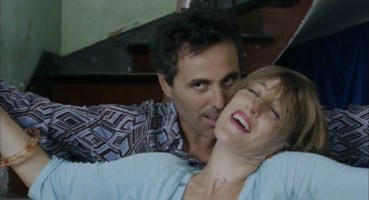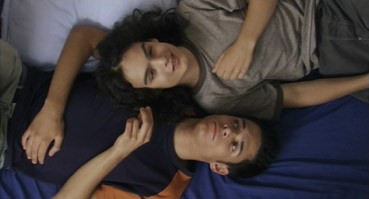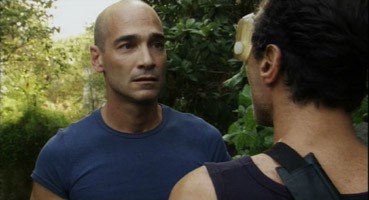|
The
USA is a funny old place at times, a land of contradictions, as the tourist ads
might have it. Take homosexuality as an example.
You'll be pushed to find a country that hosts more lavish
and celebratory Gay Pride marches, but when it comes to
gay characters in mainstream movies, well that's a
different kettle of fish. Gay characters can be funny, they
can wrestle with confusing feelings or the process of coming out, but complete, unflinching,
unprejudiced acceptance is rare indeed. I'm not saying
that things are even close to perfect in European cinema,
but without the Hollywood obsession with a restrictively
narrow demographic there is a lot more room for manoeuvre.
And I can't help taking an instant liking to any film in
which a mother accepts that her son is gay with the sort
of cheer usually reserved for news of an impending marriage.

The
mother in question is the jovial Béatrix (the delightful
Valeria Bruni Tedeschi, who may be familiar to UK viewers
for her role as the charming PR woman in Tickets)
and she and her husband Marc are taking their summer vacation
with their two teenage children, Charly and Laura, in the
seaside house of Marc's youth. They are soon joined by Charly's
friend Martin, and the two boys spend all of their time together
and are clearly very close, closer than just good friends,
Béatrix reasons. She's not shocked, surprised or
disappointed, but delighted at the wonders of young love,
but in this particular household, nothing is quite as it
seems. Charly and Martin are close, Martin is certainly
gay, but what of Charly? Mind you, Béatrix, although
seemingly content in her marriage, is also having a steamy affair
with Mathieu, who decides he would also like to spend his
vacation by the sea, resulting in late night phone calls and grabbed
afternoons of sex. Marc suspects nothing, but then he seems
to be developing an unexpected fascination for the young
Martin.
All
of which has the makings of a madcap sex farce, but the
striking thing about Cockles and Muscles [Crustacés et coquillages] is its
easy-going and unforced approach to its characters and its
complete lack of hang-ups about their sexual preferences
and activities. Marc and Béatrix are good together
(whether eating oysters or performing a song for Charly
and Martin, they appear to be as close as a couple could be) and
Béatrix's affair with Mathieu is clearly doing her as much good
as the summer sunshine. If some friction does
develop between Charly and Martin when the latter goes cruising
for sex at a traditional local pick-up spot, then it's more about how it affects their
friendship than anything approching a lovers' tiff.
Internal conflicts inevitably develop and do sometimes have a slightly
sex farce aspect to them. The bathroom shower in particular
becomes an amusing location for the relief of sexual tension,
a place for Charly and the frustrated Martin to secretly
whack off, for Béatrix and Mathieu to frolic while
the others are occupied elsewhere, and for an irritable
Marc to get all flustered when he catches sight of Martin
doing what young boys will do. Increasingly, just the sound
of the shower running becomes an emotional trigger, prompting
Martin to become all hot under the, well, you know what, and
Marc to either sneak out of the bedroom to take a peek or
complain about the drain on the hot water supply.

The
revelations really get under way with the introduction of
good-looking plumber Didier (a divinely cast Jean-Marc Barr),
who comes on aggressively to Charly when all he was doing
at the local hook-up point was tailing Martin, and only backs off
when he finds out just who Charly's father is. Later, he
is called to the house to fix the hot water, which Marc
has sabotaged, and... well, go see for yourself.
It
all unfolds in amiable and good-natured fashion, right up
to the almost fairy-tale ending and song-and-dance finale.
There's nothing particularly groundbreaking here, but the
performances are most engaging, the characters increasingly
likeable and involving, and the cheerful acceptance and
later celebration of the positive effects of giving in to
your desires, whoever they may be for, certainly put a big
smile on my face.
Before
I commit myself on either picture and sound, I should mention
that the preview discs we have received for Peccadillo releases
have not so far been fully representative of the finished
product. Anahi Berneri's involving A Year Without
Love in particular had a transfer that I
could not believe even a small independent company would
put out on DVD (as it turned out it wasn't, and the final
release disc apparently looks fine), and as a result we
did not review it. Like that disc, Cockles and Muscles lacks the menus that presumably grace the final release,
but the print on offer is an anamorphic widescreen one and
in pretty good shape, and I'm going to take a chance and
presume that this is the one that appears on the final release
disc. There is a slight softness to the picture and the
colour sometimes has a faintly 'aged' quality to it (which
could, of course, be deliberate), but the contrast and detail
is generally good. The film was shot entirely on High Definition
Video, and the transfer appears to have been taken from
the film print, not the hi-def master.
The English subtitles here are fixed – I can't vouch for
the release disc.

The
Dolby 2.0 stereo soundtrack is very clear and has a good
dynamic range, especially evident in the score. What I cannot
be sure of is whether this is the only soundtrack available,
as the method used to write the preview disc (a Sony hard
disc/DVD recorder if I'm not mistaken) does not allow for
multiple soundtracks. A couple of online DVD stores suggest
the presence of a directors' commentary, but there's certainly
not one of the preview disc.
Karaoke (5:29) features the two musical numbers in the film, complete
with subtitles that change colour to indicate where you
should be if you are singing along.
Listed
rather wonderfully on the preview DVD sleeve as A
Short Documentary: How to Shoot Wanking in the Shower (7:49), this is a fun behind-the-scenes featurette about
filming, well, you can probably guess. It's preceded by
a warning about the content, mainly for the sizeable prosthetic
penis made and worn for the scene – an amusing moment has
a female make-up artist surprised and embarrassed to be
caught on camera while working on it, so to speak.
Outtakes (3:13) is a small collection of unused moments, a couple
of which – Valeria Bruni Tedeschi falling off her bicycle
being the most memorable – are certainly worth a look.
The Making of the Dance (Vaudeville) Sequence (15:19) shows the rehearsal and shooting of the final musical
number and is narrated by co-director Jacques Martineau.
Reference here is made to a deleted scenes section on the
DVD, which is not present.
The Q&A With Olivier Ducastel & Jacques
Martineau (63:36) is a two-parter, the first
and longest recorded at the Cardiff screen festival and
chaired by Sarah Howells, the second at the London Lesbian
& Gay Film Festival in 2005 and hosted by Brian Robinson.
The acoustics of the locations are less than ideal, but
both are very interesting for anyone who enjoyed the film
itself, with the shorter second Q&A being the livelier
and funnier. There's a touching moment when the two directors,
a gay couple themselves, are presented with a gift to mark
their tenth anniversary together.
A
film that would be too easy (and inaccurate) to pigeonhole
as queer cinema, Cockles and Muscles definitely
has a potential for wider appeal and deserves to find an
audience outside of the club circuit. It's a thoroughly
good-natured piece with a positive message for us all about
relationships and desire, and is worth seeing for its cast
alone. Peccadillo's DVD features a largely decent transfer
and some very worthwhile extra features, and as such represents
a good value buy for all but the more prudish, who frankly
could do with spending a few days up at the fort.
|